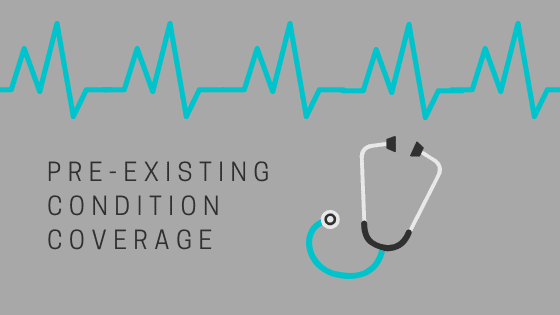Pre-existing Condition Coverage: Frequently Asked Questions

Are you wondering about pre-existing condition coverage? You’re not alone. This article aims to answer your frequently asked questions.
Find out what a pre-existing condition is, who is eligible for coverage, and how the Affordable Care Act protects individuals like you.
Learn about limitations, covered healthcare services, and how insurance companies determine costs.
Discover if coverage can be denied or canceled, and get tips for ensuring you have the best pre-existing condition coverage possible.
Key Takeaways
- Pre-existing condition coverage is available for health issues diagnosed before obtaining insurance, including chronic conditions, past surgeries or injuries, and mental health conditions.
- Eligibility for pre-existing condition coverage varies depending on the insurance provider and policy, but generally requires having a documented pre-existing condition and being enrolled in a qualified health insurance plan.
- The Affordable Care Act (ACA) prohibits insurance companies from denying coverage or charging higher premiums based on pre-existing conditions, ensuring that insurance plans must cover pre-existing conditions without limitations or exclusions.
- Insurance companies are required to offer coverage regardless of pre-existing conditions, and ACA-compliant plans must cover essential health benefits, providing comprehensive and affordable coverage for individuals with pre-existing conditions.
What Is a Pre-Existing Condition
If you have a health condition that you were diagnosed with before obtaining health insurance, that’s considered a pre-existing condition. It’s important to understand the definition and types of pre-existing conditions.
A pre-existing condition is any health issue that you had, were treated for, or sought medical advice for before getting insurance coverage. This includes chronic conditions like diabetes, asthma, or heart disease, as well as past surgeries or injuries. It can also include mental health conditions such as anxiety or depression.
The types of pre-existing conditions can vary greatly, but they all have one thing in common: they existed before you had insurance. Knowing this definition and being aware of the types of pre-existing conditions is crucial when seeking health insurance coverage.
Who Is Eligible for Pre-Existing Condition Coverage
Are you wondering if you qualify for pre-existing condition coverage?
The eligibility criteria for coverage can vary depending on the insurance provider and the specific policy.
It’s important to understand the definition of a pre-existing condition and any exceptions or exclusions that may apply to your situation.
Eligibility Criteria for Coverage
To be eligible for pre-existing condition coverage, you must meet specific criteria.
The eligibility criteria for pre-existing condition coverage include having a documented pre-existing condition, such as diabetes or heart disease, and being enrolled in a qualified health insurance plan.
It’s important to note that pre-existing condition coverage is subject to certain limitations.
For example, there may be waiting periods before coverage for pre-existing conditions takes effect. Additionally, coverage for pre-existing conditions may be limited to certain treatments or medications.
It’s crucial to review the terms and conditions of your health insurance plan to understand the specific limitations and coverage provided for pre-existing conditions.
Pre-Existing Condition Definition
To be eligible for pre-existing condition coverage, you must meet specific criteria, including having a documented pre-existing condition and being enrolled in a qualified health insurance plan.
A pre-existing condition is a health condition that you have before applying for health insurance. It could be anything from asthma to diabetes, or even a past surgery.
The purpose of pre-existing condition coverage is to ensure that individuals with these conditions can still access healthcare without facing discrimination or higher premiums.
When it comes to pre-existing condition coverage options, it’s important to note that under the Affordable Care Act, all health insurance plans must cover pre-existing conditions. This means that even if you have a pre-existing condition, you can still get the coverage you need.
Exceptions or Exclusions
You may qualify for pre-existing condition coverage if you meet certain criteria, including having a documented pre-existing condition and being enrolled in a qualified health insurance plan. However, it’s important to note that there are exceptions and limitations to this coverage.
Here are four key points to consider:
- Waiting periods: Some insurance plans may have a waiting period before they provide coverage for pre-existing conditions. During this time, you may have to pay for any treatment related to your pre-existing condition out of pocket.
- Exclusions: Certain pre-existing conditions may be excluded from coverage altogether. It’s essential to carefully review the terms and conditions of your health insurance plan to understand which conditions are excluded.
- Prior authorization: In some cases, you may need to obtain prior authorization from your insurance provider before receiving treatment for your pre-existing condition. Failure to do so could result in denied coverage.
- Coverage limits: Insurance plans may have limits on the amount of coverage provided for pre-existing conditions. Make sure to understand these limits and how they may affect your healthcare expenses.
Remember to consult with your insurance provider or a qualified healthcare professional to fully understand the exceptions and limitations of pre-existing condition coverage in your specific plan.
How Does the Affordable Care Act Protect Individuals With Pre-Existing Conditions
The Affordable Care Act (ACA) offers crucial protections for individuals with pre-existing conditions. Under the ACA, insurance companies are prohibited from denying coverage or charging higher premiums based on pre-existing conditions.
This means that individuals can’t be denied health insurance or be charged more because of their pre-existing conditions, ensuring access to affordable healthcare for all.
ACA and Pre-Existing Conditions
Individuals with pre-existing conditions are guaranteed coverage under the Affordable Care Act. This means that insurance companies can’t deny you coverage or charge you more based on your pre-existing condition. Here is what you need to know about ACA and pre-existing conditions:
- Coverage is available: The ACA ensures that insurance plans must cover pre-existing conditions, including chronic illnesses and disabilities.
- No limitations or exclusions: Insurance companies can’t impose limitations or exclusions on pre-existing condition coverage. This includes prescription drugs, hospital stays, and doctor visits related to your pre-existing condition.
- No waiting periods: The ACA prohibits insurance companies from imposing waiting periods before covering pre-existing conditions. You can get the care you need right away.
- Marketplace options: If you don’t have access to employer-sponsored insurance, you can find coverage through the Health Insurance Marketplace, where pre-existing condition coverage is guaranteed.
Coverage Under ACA
Now that we’ve covered how the ACA guarantees coverage for pre-existing conditions, let’s examine how the Affordable Care Act protects individuals with these conditions.
Under the ACA, individuals with pre-existing conditions have access to a range of coverage options. This includes the option to purchase health insurance through the Health Insurance Marketplace, where they can compare plans and choose the one that best suits their needs.
Additionally, the ACA prohibits insurance companies from denying coverage or charging higher premiums based on pre-existing conditions. This means that individuals with pre-existing conditions can’t be discriminated against when it comes to obtaining health insurance.
It’s important to note that while the ACA provides protections for individuals with pre-existing conditions, it may have an impact on insurance premiums for some individuals. However, these impacts are typically outweighed by the benefits of having access to comprehensive and affordable coverage.
Protections for Individuals
Under the ACA, you have access to various protections if you have a pre-existing condition. Here are some key protections to keep in mind:
- Guaranteed Issue: Insurance companies are required to offer you coverage, regardless of your pre-existing condition. They can’t deny you or charge you more because of it.
- Essential Health Benefits: All ACA-compliant insurance plans must cover essential health benefits, including services related to your pre-existing condition. This ensures you have access to the necessary treatments and medications.
- No Annual or Lifetime Limits: The ACA prohibits insurance plans from placing limits on the amount they’ll pay for your care over a year or your lifetime. This means your coverage will continue even if your medical expenses are high.
- Medicaid Expansion: Depending on your income and state, you may qualify for Medicaid, which provides affordable or free health coverage to individuals with pre-existing conditions.
These protections give you peace of mind and ensure that you have access to the insurance options and care you need to manage your pre-existing condition.
Are There Any Limitations or Exclusions to Pre-Existing Condition Coverage
There may be some limitations or exclusions to pre-existing condition coverage that you should be aware of. While the goal is to provide comprehensive coverage for pre-existing conditions, certain limitations may apply. These limitations could include waiting periods before coverage begins, meaning that you may have to wait for a certain period of time before your pre-existing condition is covered.
In some cases, there may also be exclusions for certain pre-existing conditions that are deemed to be high-risk or require specialized treatment. It’s important to carefully review the terms and conditions of your insurance policy to understand any limitations or exclusions that may apply.
If you have any questions or concerns, don’t hesitate to reach out to your insurance provider for clarification.
What Types of Healthcare Services Are Covered Under Pre-Existing Condition Coverage
To ensure comprehensive coverage for your pre-existing condition, the healthcare services covered include:
- Diagnostic tests: These include laboratory tests, imaging studies, and other medical procedures that help in diagnosing your condition accurately.
- Medications: Prescription drugs that are necessary for managing your pre-existing condition are covered. This ensures that you have access to the medications you need without financial burden.
- Necessary treatments: Any medically necessary treatments, such as surgeries, therapies, or other interventions required to manage your pre-existing condition, are included in the coverage.
- Preventive care: Many pre-existing condition coverage plans also include preventive care services, such as vaccinations, screenings, and health check-ups, to help you maintain your overall health.
Keep in mind that coverage eligibility may vary depending on your specific insurance plan and the terms and conditions outlined by your provider. It’s always advisable to review your plan documents or consult with your insurance provider for a detailed understanding of the healthcare services covered under your pre-existing condition coverage.
How Do Insurance Companies Determine the Cost of Coverage for Individuals With Pre-Existing Conditions
Insurance companies determine the cost of coverage for individuals with pre-existing conditions based on several factors.
One of the main factors is the cost calculation, which takes into account the expected healthcare expenses associated with the pre-existing condition. This includes the cost of medications, treatments, and doctor visits that the individual may need.
Another factor is the risk assessment, which evaluates the likelihood of the individual needing expensive medical care in the future due to their pre-existing condition. Insurance companies consider factors such as the severity of the condition, the individual’s medical history, and any potential complications that may arise.
Based on these factors, the insurance company determines the premium or cost of coverage for individuals with pre-existing conditions. It’s important to note that each insurance company may have their own unique method of calculating costs, so it’s advisable to compare different options before making a decision.
Can Pre-Existing Condition Coverage Be Denied or Canceled
If you have a pre-existing condition, insurance companies can’t deny or cancel your coverage based on that condition. This is an important protection provided under the Affordable Care Act. However, there are certain denial reasons and cancellation policies that you should be aware of.
Here are four key points to keep in mind:
- Denial reasons: Insurance companies can still deny coverage or charge higher premiums based on factors other than pre-existing conditions, such as age, tobacco use, or geographic location.
- Waiting periods: Some insurance plans may impose waiting periods before they cover treatment related to pre-existing conditions. During this waiting period, you may have to pay for the treatment out of pocket.
- Cancelation policy: Insurance companies can’t cancel your coverage solely because you have a pre-existing condition. However, they can cancel your coverage for non-payment of premiums or if you provide false information on your application.
- Appeals process: If your pre-existing condition coverage is denied or canceled, you have the right to appeal the decision. Insurance companies are required to provide a detailed explanation of their denial or cancellation and offer an opportunity for appeal.
What Steps Can I Take to Ensure I Have the Best Pre-Existing Condition Coverage?
Maximizing your pre-existing condition coverage requires proactive steps on your part. To ensure you have the best coverage, there are a few steps you can take.
First, thoroughly research and compare different insurance plans to find the one that best suits your needs. Look for plans that specifically mention coverage for pre-existing conditions.
Next, read the policy details carefully, paying attention to any exclusions or limitations related to your condition.
It’s also important to disclose all relevant information about your pre-existing condition to the insurance provider when applying for coverage. This will help avoid any potential issues or denials in the future.
Lastly, consider seeking guidance from a licensed insurance agent or broker who can provide expert advice and assist you in finding the best insurance plan for your specific needs.
Frequently Asked Questions
What Are the Common Pre-Existing Conditions That Are Covered Under Pre-Existing Condition Coverage?
Common pre-existing conditions covered include diabetes, asthma, cancer, and heart disease. To apply for pre-existing condition coverage, contact your insurance provider and provide necessary medical records and documentation.
Can I Still Get Pre-Existing Condition Coverage if I Have Been Uninsured for a Certain Period of Time?
Yes, you can still get pre-existing condition coverage after a certain period of being uninsured. There are options available for low-income individuals who need pre-existing condition coverage.
Are There Any Waiting Periods Associated With Pre-Existing Condition Coverage?
Yes, there may be waiting periods for pre-existing condition coverage. These waiting periods are put in place to ensure that you have continuous coverage and to prevent abuse of the system.
Can I Switch Insurance Plans Without Losing My Pre-Existing Condition Coverage?
Yes, you can switch insurance plans without losing your pre-existing condition coverage. It is important to research and compare different plans to ensure your coverage remains intact during the transition.
What Happens if I Am Denied Pre-Existing Condition Coverage?
If you’re denied pre-existing condition coverage, there are alternatives available. However, it’s important to understand the consequences of being denied coverage and to explore all options to ensure you have the necessary healthcare support.









